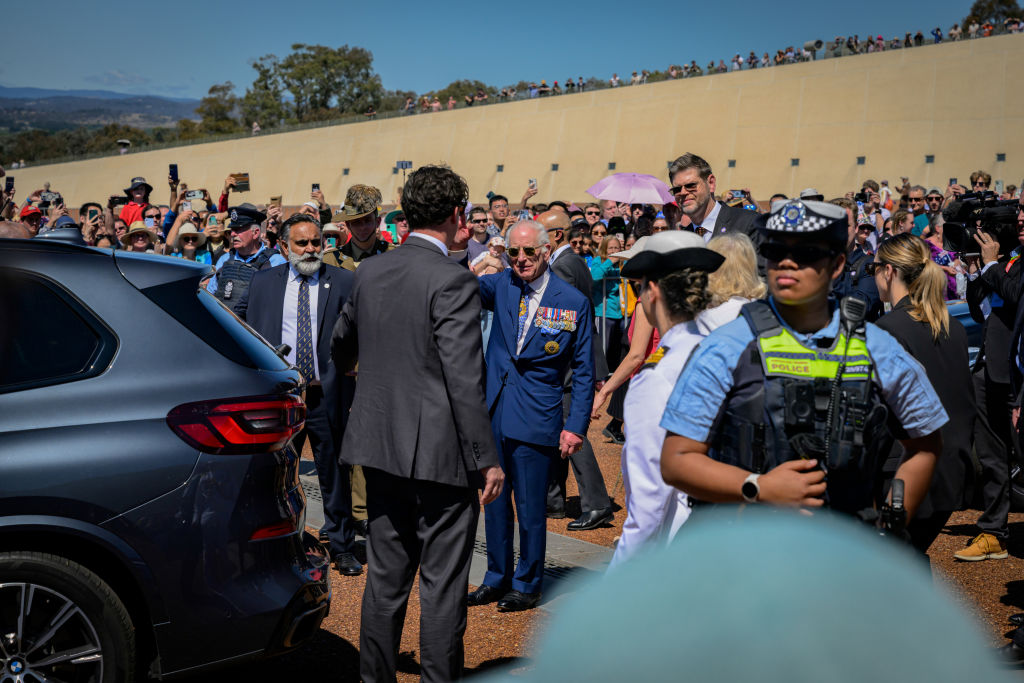Topline
An Aboriginal senator was escorted out of a parliamentary reception for King Charles III and his wife, Camila, in Australia on Monday, after yelling that he’d “committed genocide against our people” and demanding a treaty between British colonizers and Australia’s Indigenous people.
Key Facts
Sen. Lidia Thorpe, who descends from several Aboriginal Australian groups, yelled at Charles at a reception hosted by Australian Prime Minister Anthony Albanese, saying, “Give us our land back, give us what you stole from us — our bones, our skulls, our babies, our people.”
She was stopped by security from directly approaching Charles, who spoke quietly with the prime minister until she was escorted out while yelling, “You are not our King,” now-viral videos show.
The heckling has re-sparked online conversations about Australia’s relationship to the British crown; Australians decided in 1999 to retain then-Queen Elizabeth II as head of state (while polls showed a majority favored establishing a new republic, other factors, like disagreement about how a president would be elected, led to the referendum’s defeat).
Several groups, including the Australian Republic Movement and Albanese’s center-left Labor Party, have advocated to transform Australia into a republic with an Australian citizen as head of state, severing its constitutional ties with Britain.
Loading...
Surprising Fact
Australia removed the British monarchy from its paper money in 2023, issuing new $5 bills that featured an Indigenous design rather than an image of King Charles III. The $5 bill was the last paper currency still featuring an image of the monarch. Coins in the country still picture the monarch.
Key Background
An estimated 20,000 Indigenous residents (and 2,500 European settlers) are estimated to have died in conflicts in Australia between when the British first colonized in the late 1700s and the creation of the Commonwealth of Australia in 1901. No treaty has ever been struck between the British and Australia’s Indigenous people, and political groups are divided on how the country’s relationship with the British empire should look going forward. The center-left Labor Party of the prime minister wants to see an Australian installed as the head of state, while opposition leader Peter Dutton wants the British king to continue on as Australia’s monarch. Despite the disagreement, there hasn’t been a major push to make Australia a republic in more than 20 years (since the 1999 referendum). Thorpe is among those who believe a binding treaty should be created to address the historical abuse of Aboriginal people, to return unused land to its original owners and to establish standalone Senate seats for Indigenous representatives. She also supports the “Pay the Rent” campaign, which advocates for non-Indigenous Australians to voluntarily pay reparations to people from First Nations communities.
Tangent
Albanese, the prime minister who welcomed King Charles Monday, is an advocate for separating Australia from the British monarch. In his welcome speech, he said Charles has “shown great respect for Australians, even during times when we have debated the future of our own constitutional arrangements and the nature of our relationship with the Crown.” The premiers of the six states of Australia—who represent New South Wales, Victoria, Queensland, Western Australia, South Australia and Tasmania—all declined to attend Charles’ reception Monday, which monarchists said was “insulting.” The Australian Republic Movement requested a meeting with Charles during his visit, the Associated Press reported, but none appears on his official itinerary. So far the king’s visit has included a church service, two speeches, the reception and a stop to lay wreaths at the Australian War Memorial. The six-day visit is Charles’s first visit to Australia since he became the monarch and the biggest trip since he started cancer treatment in February.
Loading...
